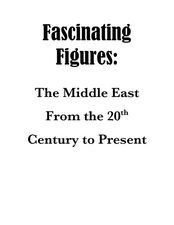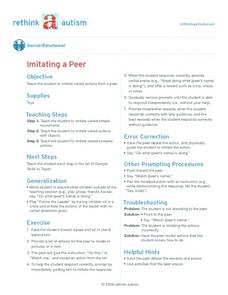University of Florida
Unlock Your Leadership Potential: A Leadership Project Guide
The 359-page guide is designed to help high schoolers develop their leadership skills. Class members generate a list of leadership characteristics, research outstanding leaders, consider their own leadership style, and practice...
Anti-Defamation League
Representing the People: Diversity and Elections
After studying statistics and reading articles about diversity in the 2018 through 2020 U.S. elections, young social scientists discuss what they believe is the impact of having more diverse elected officials. Individuals then select one...
Curated OER
Leadership
Young scholars list the qualities of a good leader as well as the various roles of group members. They discuss how good leaders help make the group more successful and identify people in their community who are good leaders. Students...
Curated OER
Fascinating Figures: The Middle East from the 20th Century to Present
Learners examine the leaders of the Middle East. In this Middle East lesson, students read biographies regarding featured twentieth century leaders of Egypt, Israel, Iran, Iraq, Jordan, Libya, Syria, Tunisia, Turkey, and Yemen. Learners...
Curated OER
The Rule of Law
Students continue their exploration of the concept of rule of law. As a class, they discuss how Civil Rights leaders followed the rule of law in their protests. After reading various articles, they participate in a discussion and...
Curated OER
Who influences the development of the laws?
Ninth graders explore how laws are created. They examine how committee members are selected. Students assess the influences that affect the voting of Congressional Committee Members. They identify the formal majority and minority leaders...
Curated OER
Eminent Domain: Whose Land is it Anyway?
Students research eminent domain and whether or not there has been a land dispute in their community. Students search local newspapers, local history books or talk with civic leaders and long-time citizens and create a chart showing the...
Curated OER
How Ordinary People Can Have an Impact
Students identify three or more ways the Federal Government impacts their daily lives and then explore ways in which citizens can influence political leaders.
Curated OER
All Around the Neighborhood - Part 2
Second graders review community leaders, their role and responsibility. After reviewing the job of a police officer, they write about the skills, roles and responsibilities a worker has on a provided silhouette. Students share their...
Curated OER
Statesmen and Tyrants Quiz 1
In this statesmen and tyrants worksheet, students complete short answer questions where they name the leaders of countries that are described. Students complete 10 problems.
Curated OER
Women in Power
Learners read a five-paragraph article about female political leaders of the world then respond to five short-answer questions. They also work through a series of vocabulary-building exercises. A glossary is included.
Curated OER
Imitating a Peer
Imitation of a peer is what your autistic learners will focus on today. You'll prompt them to imitate a selected peer, either their actions, emotions, or facial expressions. This is done through repetitive trails and positive...
Curated OER
The Formation of Public Opinion: Ch 8
After reading about the formation of public opinion, the class can complete this quiz. They answer 5 true/false statements regarding public policy, political attitudes, and public opinion. Then they answer 5 multiple-choice questions...
Curated OER
The National Association of Colored Women
Students examine the gender roles of NACW activists. They also discover the attitudes associated with race in the NACW. They work together in groups to write a letter to the leader of the time period.
Curated OER
The Roman Calendar
In this calendar worksheet, learners read about the characteristics of the Roman calendar. They write the names of the English months next to the names of the Roman months. They write down the name of the 2 months that are named after...
Curated OER
The Organization of Political Parties
Challenge the future world leaders in your class with this activity, which tests their knowledge on the organization of modern political parties. Students can access their prior knowledge of current elections, or notes from your lecture,...
Curated OER
Before Rosa Parks: Ida B. Wells
The contributions of Ida B. Wells to the Civil Rights Movement are the focus of this social studies instructional activity. Middle schoolers read a handout regarding Wells, discuss the handout, and write about non-conformist behavior.
Curated OER
Planning a Government
Demonstrate the complexities of running a government with this group activity. Young politicians are arranged into small groups and become leaders of a hypothetical country (outline of country provided). Groups must outline 6 (listed)...
Curated OER
Remembering the Forgotten War
Ninth graders examine the major events and significance of the Korean War, including U.S. involvement in the war. In this World History instructional activity, 9th graders read primary source materials to understand the political,...
Curated OER
What Do They Have In Common?
Fifth graders use a database to gather information on the United States last five Presidents. Using the information, they identify their similarities and differences and what characteristics made them a good leader. In further detail,...
Curated OER
What Does George W. Bush Have in Common With Past U.S. Presidents?
Sixth graders discover what it takes to become President of the United States. Using a database, they complete a scavenger hunt to determine what George W. Bush has in common with past Presidents. They also create a spreadsheet which...
Foreign Policy Research Institute
Propaganda - 9/11 and the War on Terrorism
Propaganda is an important topic that most high school social studies teachers address. Here, learners compare and contrast methods of public persuasion during WWII with those used in the contemporary War on Terror. Research, discussion,...
Curated OER
Break the Code: Anthropology Terms
Spice up your study of basic anthropology terms using this decoding learning exercise. Using a provided code, learners answer 10 fill-in-the-blank questions. Because the code is very simple, more advanced pupils may enjoy the challenge...
Curated OER
Fix the Problem!
People won't let me finish talking!...I hate the lunch room...Leave my name alone! Explore a variety of problems learners can face on a daily basis, and use this game to have pupils determine the best ways to answer those situations.

























